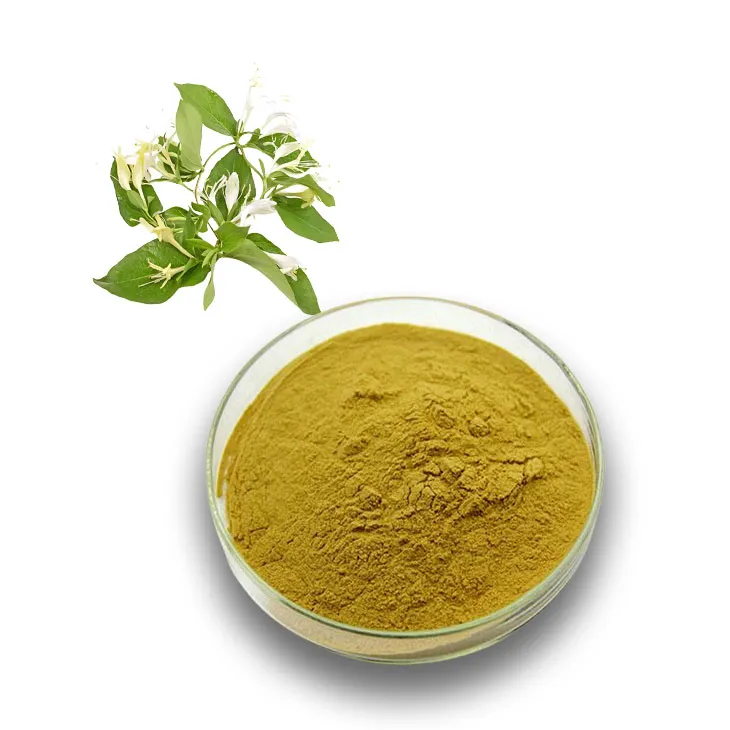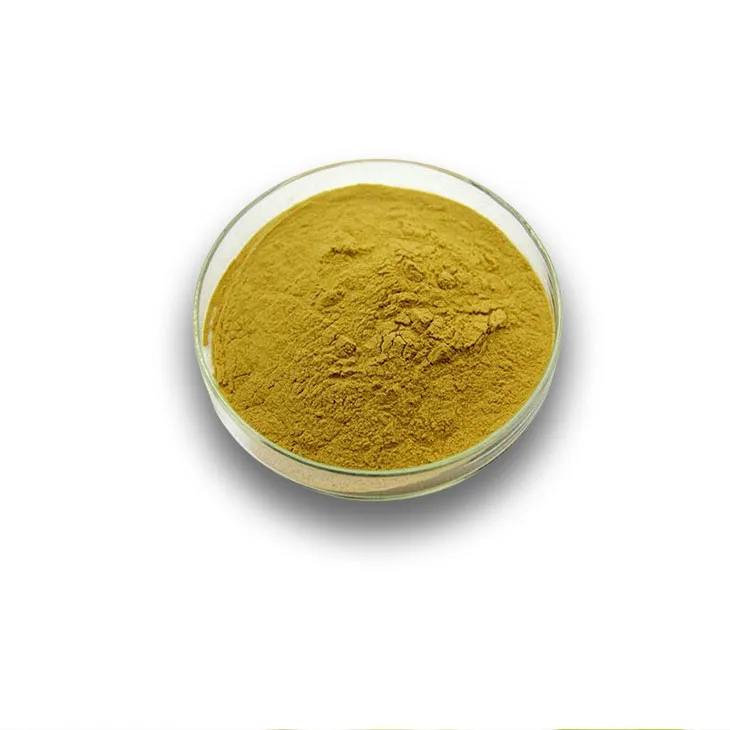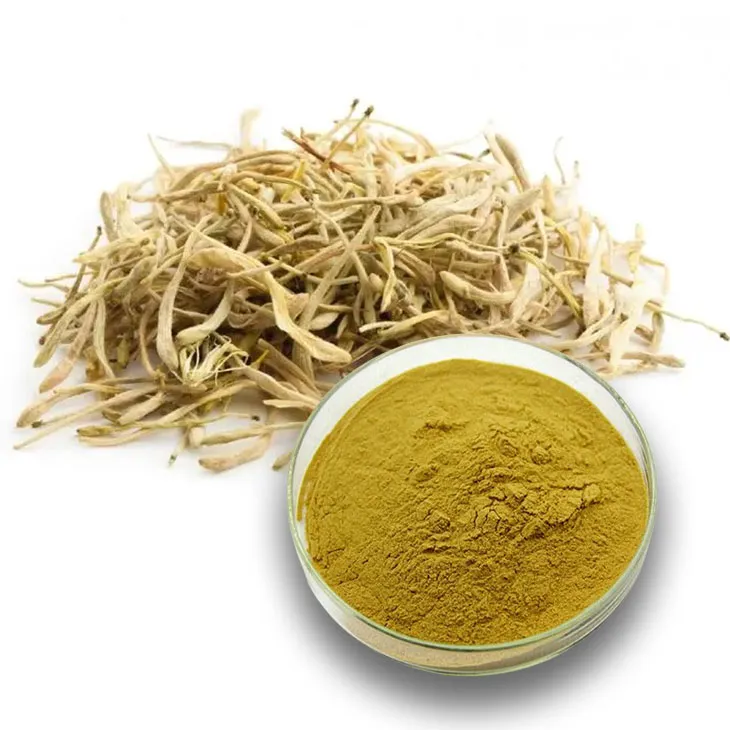- 0086-571-85302990
- sales@greenskybio.com
4 Things Consumers and Manufacturers Should Know about Honeysuckle Pollen.
2024-12-15

1. Properties of Honeysuckle Pollen
Honeysuckle Pollen has unique physical and chemical properties that are important to understand.
Physical Properties
Honeysuckle Pollen is typically small in size, often with a distinctive shape that can be identified under a microscope. It has a fine texture and is usually light in weight. The color of honeysuckle pollen can range from a pale yellow to a slightly off - white, depending on the species of honeysuckle and environmental factors such as soil conditions and sunlight exposure.
Chemical Composition
Chemically, honeysuckle pollen contains a variety of components. It is rich in proteins, which are essential for its role in plant reproduction and also potentially beneficial for human or animal consumption in some cases. Additionally, it contains carbohydrates, which provide energy for the pollen's development and can also be a source of nutrition. There are also small amounts of lipids, vitamins, and minerals present in honeysuckle pollen. For example, it may contain vitamins like vitamin C, which is known for its antioxidant properties, and minerals such as potassium and magnesium that play important roles in various biological functions.

2. Safety of Honeysuckle Pollen
Safety is a crucial aspect when it comes to honeysuckle pollen, whether for consumers using products containing it or manufacturers handling it during production.
Allergies
One of the main safety concerns related to honeysuckle pollen is the potential for allergic reactions. Just like other types of pollen, honeysuckle pollen can cause allergic symptoms in some individuals. These symptoms can range from mild, such as sneezing, itchy eyes, and a runny nose, to more severe reactions like difficulty breathing and skin rashes. People with pre - existing pollen allergies are more likely to be affected by honeysuckle pollen. Manufacturers need to clearly label products that may contain honeysuckle pollen to warn those with allergies.
Toxicity
In general, honeysuckle pollen is not considered highly toxic. However, it is important to note that some species of honeysuckle may have parts that are toxic if ingested in large quantities. For example, the berries of certain honeysuckle species can be toxic to humans and animals. While the pollen itself is not typically associated with toxicity, there is a need for proper quality control during collection and processing to ensure that no harmful substances are present. Manufacturers should also follow strict safety protocols to prevent any contamination that could lead to toxicity issues.

3. Market Value of Honeysuckle Pollen
Honeysuckle pollen has significant market value, which is driven by various factors in both the consumer and industrial sectors.
Consumer Market
In the consumer market, honeysuckle pollen is increasingly being used in various products. It is a popular ingredient in some natural health products due to its perceived health benefits. For example, it is sometimes included in dietary supplements that claim to boost the immune system or improve overall health. Honeysuckle pollen - based products also have a market in the beauty and skincare industry. It is used in some creams and lotions, as it is believed to have moisturizing and anti - aging properties. The demand for these products has led to an increase in the market value of honeysuckle pollen in the consumer market.
Industrial Applications
In the industrial sector, honeysuckle pollen has value as well. It can be used in the production of certain pharmaceuticals, where its chemical components may be extracted and utilized for medicinal purposes. Additionally, in the field of biotechnology, honeysuckle pollen can be a source of genetic material or used in research related to plant - pollinator interactions. The industrial applications of honeysuckle pollen contribute to its overall market value, as companies are willing to invest in its extraction, processing, and utilization.

4. Industry Regulations for Honeysuckle Pollen
To ensure the safe and proper handling of honeysuckle pollen, there are industry regulations in place.
Quality Control Regulations
Quality control regulations are essential for honeysuckle pollen products. These regulations govern aspects such as the purity of the pollen, ensuring that it is free from contaminants such as pesticides, heavy metals, and other harmful substances. Manufacturers are required to conduct regular testing to meet these quality standards. For example, in the production of honeysuckle pollen - based dietary supplements, strict limits are set on the levels of heavy metals like lead and mercury. If these limits are exceeded, the product cannot be sold in the market.
Labeling Regulations
Labeling regulations play a crucial role in protecting consumers. Products containing honeysuckle pollen must have accurate and clear labels. The label should include information such as the source of the pollen, any potential allergens present, and instructions for use. For example, if a skincare product contains honeysuckle pollen, the label should clearly state this ingredient and also mention if it is suitable for different skin types. This helps consumers make informed decisions about the products they purchase.

FAQ:
What are the main properties of honeysuckle pollen?
Honeysuckle pollen typically has certain physical and chemical properties. It may have a characteristic shape, size, and color under the microscope. Chemically, it contains various nutrients such as proteins, amino acids, vitamins, and minerals. These properties contribute to its potential uses in different products and applications.
Is honeysuckle pollen safe for consumption?
The safety of honeysuckle pollen for consumption depends on several factors. Generally, when sourced and processed properly, it can be safe. However, some people may have allergies to it, which can cause allergic reactions. Also, if it is contaminated during collection or processing, it can pose risks. So, proper quality control and safety testing are essential.
What is the market value of honeysuckle pollen?
The market value of honeysuckle pollen can be influenced by multiple factors. It has value in the food industry as an ingredient in some health - related products due to its nutritional content. In the cosmetic industry, it may be used in products for its potential beneficial effects on the skin. Its scarcity, production costs, and consumer demand also play a role in determining its market value.
What are the industry regulations regarding honeysuckle pollen?
The industry regulations for honeysuckle pollen mainly focus on aspects such as quality control, safety standards, and labeling requirements. For example, there are regulations on the proper collection methods to ensure purity and freedom from contaminants. There are also rules regarding the testing for allergens and the accurate labeling of products containing honeysuckle pollen to inform consumers about its contents and potential risks.
How can manufacturers ensure the quality of honeysuckle pollen?
Manufacturers can ensure the quality of honeysuckle pollen by implementing strict sourcing procedures. This includes selecting reliable suppliers who follow good agricultural and collection practices. They should also conduct regular quality tests for contaminants, purity, and nutritional content. Additionally, proper storage and handling conditions are crucial to maintain the quality of the pollen.
Related literature
- Properties and Applications of Honeysuckle Pollen"
- "Safety Evaluation of Honeysuckle Pollen in Food Products"
- "Market Trends of Honeysuckle Pollen - based Products"
- "Industry Regulations for Botanical Pollen: Focus on Honeysuckle"
- ▶ Hesperidin
- ▶ citrus bioflavonoids
- ▶ plant extract
- ▶ lycopene
- ▶ Diosmin
- ▶ Grape seed extract
- ▶ Sea buckthorn Juice Powder
- ▶ Beetroot powder
- ▶ Hops Extract
- ▶ Artichoke Extract
- ▶ Reishi mushroom extract
- ▶ Astaxanthin
- ▶ Green Tea Extract
- ▶ Curcumin Extract
- ▶ Horse Chestnut Extract
- ▶ Other Problems
- ▶ Boswellia Serrata Extract
- ▶ Resveratrol Extract
- ▶ Marigold Extract
- ▶ Grape Leaf Extract
- ▶ blog3
- ▶ blog4
- ▶ blog5
-
Pure 85% Tomentil Extract.
2024-12-15
-
Eyebright Extract
2024-12-15
-
Sea buckthorn oil
2024-12-15
-
Hesperidin
2024-12-15
-
Cranberry Extract
2024-12-15
-
Cat Claw Extract
2024-12-15
-
Propolis Extract Powder
2024-12-15
-
Ginseng Root Extract
2024-12-15
-
Acerola Extract
2024-12-15
-
Nettle Root Extract
2024-12-15
-
Sophora Japonica Flower Extract
2024-12-15





















